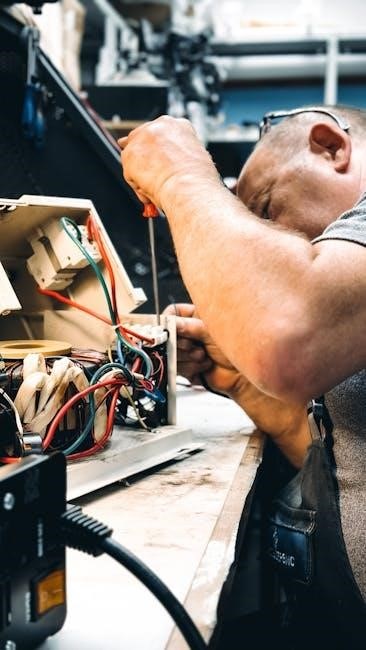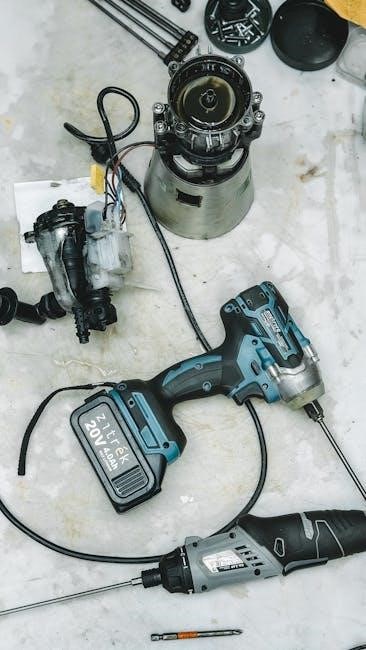The 2018 Chevrolet Silverado maintenance schedule is crucial for ensuring optimal performance, safety, and longevity. Regular upkeep prevents issues, enhances reliability, and maintains your truck’s value over time.
Overview of the Importance of Regular Maintenance
Regular maintenance is essential for the 2018 Chevrolet Silverado to ensure reliability, performance, and safety. Neglecting scheduled upkeep can lead to premature wear, breakdowns, and costly repairs. By adhering to the maintenance schedule, owners can identify and address potential issues early, preventing major damage. Routine checks, such as oil changes, tire rotations, and fluid inspections, are critical for sustaining the truck’s longevity. Proper maintenance also enhances fuel efficiency, reduces emissions, and maintains the vehicle’s value. Additionally, it ensures compliance with warranty requirements and provides peace of mind for drivers. Consistent care is vital for optimizing the Silverado’s capabilities and ensuring it runs smoothly for years to come.
Understanding the 2018 Silverado Maintenance Schedule PDF
The 2018 Silverado Maintenance Schedule PDF provides a detailed guide for owners to follow recommended service intervals. It outlines specific tasks at various mileage points, ensuring the truck operates efficiently. The document includes schedules for oil changes, tire rotations, fluid checks, and inspections. It also covers additional maintenance needs, such as cabin air filter replacements and brake system checks. The PDF is structured to help owners track and perform necessary upkeep, with clear instructions and mileage markers. By following this schedule, drivers can prevent potential issues and maintain their vehicle’s performance. The guide is an essential resource for anyone aiming to keep their Silverado in optimal condition. Regular use of this document ensures compliance with manufacturer recommendations and extends the vehicle’s lifespan.

2018 Chevrolet Silverado Maintenance Schedule Overview
The 2018 Silverado maintenance schedule provides a structured plan for routine service, ensuring optimal performance and longevity. It outlines key tasks at specific mileage intervals for proper upkeep.
Key Mileage Intervals for Scheduled Maintenance
The 2018 Silverado maintenance schedule outlines specific intervals to ensure your truck runs smoothly. Key milestones include every 7,500 miles for tire rotations and inspections, 15,000 miles for suspension checks, and 22,500 miles for air filter replacements. At 30,000 miles, transmission fluid levels should be assessed, and the cabin air filter replaced. Every 45,000 miles, brake pads and rotors need inspection, while the serpentine belt should be checked at 60,000 miles. Regular oil changes and fluid checks are recommended every 5,000 to 7,500 miles to maintain engine health. Following these intervals helps prevent major repairs and ensures long-term reliability.
Recommended Maintenance Tasks by Mileage
Regular maintenance for the 2018 Silverado is tailored to specific mileage marks to ensure reliability. At 7,500 miles, rotate tires and inspect underbody components. Oil changes are due every 5,000 to 7,500 miles, depending on driving conditions. At 15,000 miles, check suspension and transmission fluid levels, and replace the cabin air filter. By 22,500 miles, replace engine air filters and inspect brake pads. At 30,000 miles, assess belts and hoses, and perform a thorough inspection of the exhaust system. Spark plug replacement is recommended at 60,000 miles. Following these tasks ensures your Silverado remains in peak condition, avoiding costly repairs and extending its lifespan.
Oil and Fluid Maintenance
Regular oil changes and fluid checks are vital for the 2018 Silverado. Use 0W-20 synthetic oil, changing every 5,000 to 7,500 miles. Check transmission, coolant, and brake fluids regularly.
Oil Change Interval and Type Recommendations
The 2018 Chevrolet Silverado requires regular oil changes to maintain engine health. The recommended oil change interval is every 5,000 to 7,500 miles, depending on driving conditions. Synthetic 0W-20 oil is specified for optimal performance and fuel efficiency. Conventional oil may be used but results in less protection and shorter intervals. Always refer to the owner’s manual or maintenance schedule PDF for precise guidelines tailored to your driving habits. Proper oil viscosity ensures the engine operates efficiently in various temperatures, preventing premature wear and extending the vehicle’s lifespan.
Transmission Fluid Level Checks
Regular transmission fluid level checks are essential for the 2018 Chevrolet Silverado to ensure smooth gear operation and prevent damage. The recommended interval for checking transmission fluid is every 15,000 miles. Use synthetic transmission fluid, as specified in the owner’s manual, for optimal performance. Always refer to the maintenance schedule PDF for precise instructions. Low fluid levels can lead to reduced transmission efficiency and potential damage; If levels are consistently low, consult a certified mechanic to inspect for leaks or other issues. Proper fluid maintenance ensures the longevity and reliability of your Silverado’s transmission system.
Coolant and Brake Fluid Maintenance
Regular coolant and brake fluid checks are vital for the 2018 Chevrolet Silverado. Coolant should be inspected every 15,000 miles to ensure proper engine temperature regulation. Use a 50/50 mix of DEX-COOL antifreeze and water for optimal performance. Brake fluid levels should be checked every 30,000 miles to maintain reliable braking power. Always refer to the owner’s manual for specifications. Low brake fluid levels or contamination can lead to system damage. If issues arise, consult a certified mechanic to avoid costly repairs. Proper fluid maintenance ensures engine longevity, prevents overheating, and guarantees safe braking performance for your Silverado.
Tire and Wheel Maintenance
Regular tire rotations every 7,500 to 15,000 miles ensure even wear. Check tire pressures monthly and before long trips as per the owner’s manual specifications.
Tire Rotation Schedule
Regular tire rotation is essential for even tread wear and extended tire life. The recommended interval for the 2018 Chevrolet Silverado is every 7,500 to 15,000 miles. Refer to the owner’s manual for specific patterns, as rear, front, and spare tires may follow different rotation sequences. Proper rotation ensures balanced handling and prevents uneven wear, which can lead to reduced traction and premature tire replacement. Always check tire pressures before rotation, as under-inflated tires can compromise safety and efficiency. Adhering to this schedule helps maintain optimal performance and ensures your Silverado’s tires deliver their full service life.
Proper Tire Pressure Checks
Proper tire pressure checks are vital for safety, fuel efficiency, and handling. The recommended pressure for the 2018 Chevrolet Silverado is found on the tire placard, located on the driver’s doorjamb or inside the fuel filler door. Check pressure monthly and before long trips when tires are cold. Use a reliable pressure gauge, as under-inflated tires can lead to uneven wear and reduced performance. Never exceed the maximum pressure listed, as this can compromise ride comfort and traction. Regular checks ensure optimal tire life and vehicle stability, while also improving overall driving safety and efficiency.
Wheel Inspection and Balancing
Wheel inspection and balancing are essential for maintaining the 2018 Chevrolet Silverado’s performance and safety. Inspect wheels every 12,000 to 15,000 miles for damage, wear, or loose lug nuts; Proper balancing ensures a smooth ride by distributing weight evenly. Unbalanced wheels can cause vibrations, uneven tire wear, and reduced handling. Regular checks and balancing prevent these issues, enhancing comfort and tire longevity. Always refer to the maintenance schedule for specific intervals and guidelines. This practice is crucial for maintaining optimal vehicle stability and ensuring safe driving conditions. Neglecting wheel balancing can lead to premature tire wear and compromised safety features.

Brake System Maintenance
Regular brake system maintenance is vital for safety. Inspect brake pads every 12,500 miles and replace them when worn. Check rotors for wear and brake fluid levels. Ensuring proper function prevents reduced stopping power and potential damage. Adhere to the schedule to maintain reliable braking performance and avoid costly repairs. Neglecting brake maintenance can lead to unsafe driving conditions and increased repair costs over time.
Brake Pad Inspection and Replacement
Regular inspection of brake pads is essential for maintaining safe braking performance. Inspect brake pads every 12,500 miles or as indicated by the owner’s manual. Look for wear thickness below 1/8 inch, uneven wear, or visible damage. Replace pads immediately if wear is excessive. Additionally, inspect brake rotors for scoring or excessive wear. Worn brake pads can lead to reduced stopping power and increased risk of accidents. Proper replacement ensures reliable braking and prevents costly damage to other brake components. Always follow the manufacturer’s guidelines for replacement procedures to maintain safety and optimal vehicle performance. Neglecting brake pad maintenance can compromise safety and lead to higher repair costs.
Brake Fluid Level and Condition Checks
Checking the brake fluid level and condition is critical for ensuring reliable braking performance. Inspect brake fluid every 12,500 miles or as specified in the maintenance schedule. Low fluid levels can indicate leaks or worn components, while dirty or contaminated fluid can compromise brake system efficiency. Use a clean, lint-free cloth to wipe the reservoir cap before checking the level. Ensure the fluid level is between the minimum and maximum marks on the reservoir. If the fluid appears dark, cloudy, or contains debris, replace it immediately. Always use the recommended brake fluid type to maintain system integrity and prevent corrosion. Regular checks help prevent brake failure and ensure safe operation of your Silverado. Neglecting brake fluid maintenance can lead to serious safety risks and costly repairs.
Rotors and Drums Inspection
Inspecting the rotors and drums is essential for maintaining efficient braking. Check rotors every 15,000 miles for excessive wear, warping, or scoring. Look for signs of uneven wear, such as hot spots or excessive rust. Drums should also be examined for cracks, scoring, or excessive wear. If damage is found, replace the components to ensure consistent braking performance. Overlooking rotor or drum issues can lead to reduced stopping power and increased risk of brake failure. Always follow the manufacturer’s guidelines for inspection and replacement to keep your Silverado safe and reliable on the road. Regular checks can prevent costly repairs and enhance safety.

Battery and Electrical System
Regular battery and electrical system checks ensure reliable starting and operation. Inspect terminals for corrosion and clean them if necessary. Ensure the alternator belt is in good condition to prevent power interruptions. Checking these components every 15,000 miles helps maintain electrical system performance and prevents unexpected failures.
Battery Terminal Cleaning and Inspection
Regularly inspect the battery terminals to ensure proper electrical connections. Corrosion and dirt accumulation can lead to poor performance and starting issues. Clean the terminals using a wire brush and a mixture of baking soda and water. This process should be done every 15,000 miles or when signs of wear appear. Always disconnect the negative terminal first for safety. A clean and secure connection ensures reliable engine starting and optimal electrical system functionality. Refer to the 2018 Silverado maintenance schedule for detailed guidance on this essential task.
Alternator Belt Inspection
The alternator belt, also known as the serpentine belt, plays a critical role in powering essential systems like the alternator, water pump, and power steering. Inspect the belt every 15,000 miles for cracks, frays, or excessive wear. Replace it immediately if damage is detected to prevent system failures. Check the belt tension to ensure it’s within the manufacturer’s specifications. Proper maintenance of the alternator belt ensures consistent electrical power and prevents costly repairs. Refer to the 2018 Silverado maintenance schedule for detailed inspection guidelines and replacement intervals to keep your truck running smoothly and efficiently.
Filters and Air Intake Maintenance
Regular inspection and replacement of cabin and engine air filters ensure proper air quality, improve fuel efficiency, and prevent engine damage, as outlined in the schedule.
Cabin Air Filter Replacement
The cabin air filter should be replaced every 15,000 miles to maintain clean air circulation inside the vehicle. This interval ensures optimal air quality, reducing allergens and odors. Replacement is also recommended if airflow is reduced or unpleasant odors are noticed. Proper installation is crucial to prevent contaminants from bypassing the filter. Refer to the 2018 Silverado maintenance schedule for detailed instructions. Regular replacements enhance comfort and prevent potential issues with the heating and cooling system. Always use a genuine or high-quality filter to ensure effectiveness and longevity of the system.
Engine Air Filter Inspection and Replacement
The engine air filter in your 2018 Chevrolet Silverado should be inspected every 15,000 miles and replaced as needed. A dirty or clogged filter can reduce fuel efficiency, performance, and engine longevity. Replacement is typically recommended every 30,000 miles under normal driving conditions, but more frequently if driving in dusty or polluted areas. Always use a genuine GM-approved filter to ensure proper fitment and filtration. Refer to the maintenance schedule for specific guidelines. Regular replacement helps maintain optimal engine performance, improves fuel economy, and prevents potential damage to engine components. A clean filter ensures your Silverado runs smoothly and efficiently.

Suspension and Steering Maintenance
Regular suspension and steering checks ensure stability and control, preventing wear and tear. Inspect components every 15,000 miles for optimal performance and safety.
Suspension Component Inspection
The 2018 Silverado requires suspension inspections every 15,000 miles to maintain stability. Technicians check shocks, struts, and springs for wear, ensuring smooth handling and preventing costly repairs. This routine helps identify issues early, like loose suspension parts or fluid leaks. Proper inspection also ensures alignment remains accurate, preventing uneven tire wear. Regular checks help maintain the vehicle’s ride comfort and overall performance. Neglecting this can lead to reduced control and safety risks. Always refer to the maintenance schedule for precise intervals and procedures to keep your Silverado in optimal condition.
Steering System Fluid Checks
Regular checks of the steering system fluid are essential for maintaining smooth and responsive handling in the 2018 Silverado. The fluid level should be inspected every 15,000 miles to ensure optimal performance. Low fluid levels can lead to increased effort in steering, while contamination may cause system damage. Technicians will also look for signs of leaks or wear in the power steering components during these inspections. Proper fluid levels ensure consistent steering performance, enhancing both safety and control while driving. It’s crucial to adhere to the recommended schedule to prevent potential issues and maintain the vehicle’s reliability on the road.
Exhaust and Emissions System
Regular inspections of the exhaust and emissions system ensure optimal performance and compliance with environmental standards. Checks include examining for leaks, damage, and proper function of components.
Exhaust System Inspection
Regular inspection of the exhaust system is essential for maintaining performance and safety. Every 15,000 miles, inspect for leaks, damage, or corrosion in the exhaust pipes, muffler, and catalytic converter. Ensure all connections are secure to prevent leaks, which can lead to reduced fuel efficiency and increased emissions. Damaged or corroded components should be replaced promptly to avoid system failure. A faulty exhaust system can also lead to loud noises and potential safety hazards, such as carbon monoxide leaks. Proper maintenance ensures your Silverado runs smoothly, efficiently, and safely while adhering to emissions standards. Neglecting inspections can lead to costly repairs and decreased vehicle performance over time.
Emissions System Checks
Regular emissions system checks are vital for ensuring your 2018 Chevrolet Silverado operates efficiently and complies with environmental standards. These checks typically occur every 15,000 to 30,000 miles. Inspect the catalytic converter, oxygen sensors, and exhaust gas recirculation (EGR) system for proper function. Faulty emissions components can lead to decreased fuel efficiency and increased emissions. Use a qualified technician to diagnose and repair issues promptly. Neglecting emissions system maintenance can result in failed inspections, decreased performance, and potential damage to other vehicle components. Regular checks ensure your Silverado remains environmentally compliant and runs smoothly, while preventing costly repairs down the road.
Belts and Hoses Maintenance
Regular inspections of serpentine belts and coolant hoses ensure durability. Check for cracks, wear, and proper tension every 15,000 miles. Neglecting this can lead to breakdowns and costly repairs.
Serentine Belt Inspection
Inspect the serpentine belt every 15,000 miles. Look for cracks, frays, and wear on the belt’s surface. Ensure proper tension to avoid slippage. Replace if damaged to prevent engine damage.
Coolant Hose Inspection
Inspect coolant hoses every 15,000 miles for signs of wear, cracks, or leaks. Check for soft or brittle spots, and ensure connections are secure. Replace any damaged hoses to prevent overheating and engine damage. Regular checks help maintain proper coolant flow, essential for engine performance and longevity. Addressing issues early avoids costly repairs and ensures reliability. Follow the 2018 Silverado maintenance schedule for detailed guidance on inspecting and replacing coolant hoses to keep your truck running smoothly.
Owner’s Manual Guidance
Your 2018 Silverado’s owner’s manual provides detailed maintenance schedules, symbols, and instructions. Refer to it regularly to ensure proper care and understand service requirements effectively.
How to Use the Maintenance Schedule in the Owner’s Manual
Locate the maintenance schedule section in your 2018 Silverado’s owner’s manual. Review the recommended tasks at specific mileage intervals, such as every 7,500 or 15,000 miles. Understand the symbols and codes provided for clarity. Follow the outlined procedures for oil changes, tire rotations, and fluid checks. Refer to the schedule regularly to stay on track with services like cabin air filter replacement and transmission fluid inspections. This guide ensures your truck remains reliable and retains its value. Always adhere to the schedule for optimal performance and to prevent potential issues. Adjust the schedule based on your driving habits and conditions if necessary.
Understanding Symbols and Codes in the Manual
The 2018 Silverado owner’s manual uses specific symbols and codes to guide maintenance. Common symbols include oil change indicators, tire rotation markings, and fluid check icons. Codes like “A” or “B” may denote service intervals or specific tasks. Refer to the legend section in the manual to decode these symbols. Pay attention to mileage markers, such as “every 7,500 miles,” to stay on schedule. Symbols like a wrench or battery icon indicate inspections or replacements. Understanding these codes ensures you perform the right tasks at the right time. If unsure, consult the manual or contact a Chevrolet service professional for clarification.
Additional Resources
Online tools and Chevrolet’s official website provide downloadable PDFs and detailed guides for the 2018 Silverado maintenance schedule. These resources offer comprehensive and reliable information for owners.
Online Tools for Tracking Maintenance
Utilize Chevrolet’s official website and online platforms to access maintenance tracking tools. These resources allow you to monitor service history, schedule appointments, and receive reminders for upcoming tasks. Additionally, apps like myChevrolet provide personalized maintenance schedules and notifications based on your vehicle’s mileage and needs. Third-party apps also offer maintenance tracking features, enabling you to log completed services and set reminders for future tasks. These digital tools ensure you stay organized and never miss critical maintenance intervals for your 2018 Silverado. Regular updates and notifications help maintain your truck’s health and performance over time.
Dealer vs. Independent Service Providers
Choosing between a dealership and an independent service provider for your 2018 Silverado’s maintenance involves weighing cost, expertise, and convenience. Dealerships offer factory-trained technicians and genuine Chevrolet parts, ensuring adherence to the recommended maintenance schedule. They also provide warranty validation and access to specialized tools. Independent providers often offer lower prices and personalized service but may lack access to proprietary tools and parts. Consider your budget, the complexity of the service, and the importance of maintaining a factory-authorized service history when deciding. Both options can effectively maintain your vehicle, but dealerships are recommended for critical or specialized tasks.
Adhering to the 2018 Silverado maintenance schedule ensures optimal performance, longevity, and reliability. Regular upkeep enhances safety, prevents costly repairs, and maintains your truck’s value effectively over time.
Importance of Adhering to the Maintenance Schedule
Adhering to the 2018 Silverado maintenance schedule is essential for ensuring the truck’s optimal performance, safety, and longevity. Regular maintenance helps prevent mechanical issues, reduces repair costs, and maintains fuel efficiency. It also ensures that critical systems, such as brakes and suspension, function properly. By following the recommended schedule, owners can identify and address potential problems early, preventing breakdowns and extending the vehicle’s lifespan. Additionally, maintaining the truck according to the schedule preserves its value and ensures reliability for years to come. Consistency in upkeep is key to enjoying a trouble-free driving experience and protecting your investment.
Benefits of Regular Maintenance for Longevity
Regular maintenance significantly enhances the longevity of your 2018 Chevrolet Silverado. By following the recommended schedule, you prevent premature wear on critical components, reduce the risk of unexpected repairs, and improve fuel efficiency. Routine tasks like oil changes, fluid checks, and filter replacements ensure that your truck’s engine, transmission, and other vital systems operate smoothly over time. This consistent upkeep extends the lifespan of your vehicle, reducing the likelihood of major breakdowns. Proper maintenance also enhances reliability, ensuring your Silverado performs optimally for years. Regular inspections and timely replacements prevent small issues from escalating, safeguarding your investment and maintaining your truck’s durability and value.
